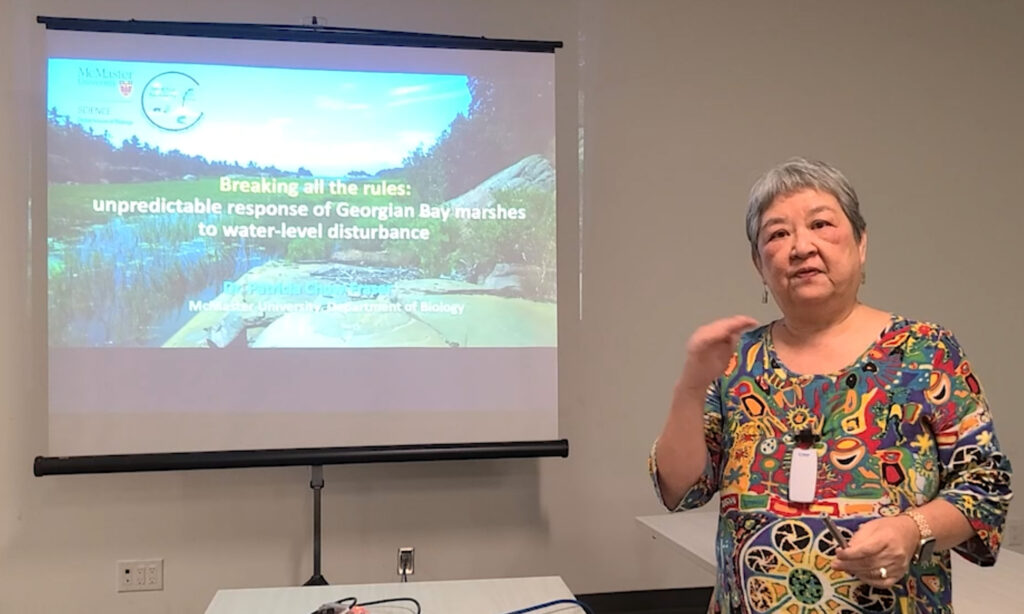2023 Fall Science Reporting Seminar
Our Science Reporting Seminar in November 2023 brought together three expert presenters who shared their detailed research and insights on critical ecological and management issues facing Georgian Bay and the Great Lakes.
The first presentation by Bill Bialkowski, a GBGLF board member and retired hydraulic control engineer, focused on the intricate challenges of water level management in the Great Lakes, with a specific emphasis on Georgian Bay. He explored the historical context of water levels since 1865, the impact of dredging and erosion in the St. Clair River, and the conveyance capacity changes affecting lake levels. His discussion also covered the controversial lake balancing strategies between Lake Superior and Michigan-Huron, and he concluded with predictions for future water levels and calls for more effective management strategies.
Professor Pat Chow-Fraser from McMaster University presented her compelling research on the ecological response of Georgian Bay wetlands to fluctuating water levels. She highlighted how these fluctuations uniquely impact Georgian Bay compared to other areas of the Great Lakes. Her study, which began in 2003, observed the transformation of wetlands during periods of low water levels followed by sudden increases, leading to significant ecological shifts. This included the development of new zones like the ‘dead tree zone’ and its impact on local wildlife. Her presentation underscored the resilience of various wetland areas and the necessity of continued, dedicated research to understand these unique ecosystems.
The seminar concluded with an engaging Q&A session, where topics such as funding opportunities for environmental research, specific focus on Georgian Bay in broader Great Lakes research, and the complexities in balancing interests across the Great Lakes were discussed. The speakers highlighted the challenges in communicating discrepancies in water level data, the tensions in water level management, and the importance of partnerships for research and advocacy.
Each of these presentations offers a deep dive into the challenges and solutions for managing and protecting Georgian Bay and the Great Lakes. They emphasize the need for ongoing research, adaptive management strategies, and community involvement to ensure the sustainability of these vital ecosystems. We highly encourage those interested in environmental issues, ecological research, and sustainable management practices to watch these informative seminar videos for a comprehensive understanding of these critical topics.
Bill Bialkowski’s Presentation
Bill Bialkowski, GBGLF board member and a retired hydraulic control engineer, discussed various aspects of water level issues in the Great Lakes, focusing particularly on Georgian Bay. He highlighted the historical context of water levels since 1865, emphasizing the significant role of the St. Clair River in changing these levels. Bill delved into the impact of dredging and erosion in the river and its effect on water levels, especially in Lake Michigan-Huron.
He discussed the International Joint Commission (IJC) and its role, studies on water levels, and measures to address high and low water levels. A significant portion of his talk revolved around the conveyance capacity of the St. Clair River and the additional erosion identified in studies, which contributed to lower water levels. Bill also touched upon lake balancing, especially between Lake Superior and Michigan-Huron, and its ineffectiveness in addressing water level discrepancies.
The presentation included predictions for future water levels, citing studies by Environment Canada and Baird & Associates. He underscored the need for more effective management of water levels, suggesting flexible structures in the St. Clair River that would operate only during low supplies but otherwise have no impacts. The talk concluded with an emphasis on the challenges faced due to rising and falling water levels and a call for further action and research.
Professor Pat Chow-Fraser from McMaster University presented her research on the ecological response of Georgian Bay wetlands to fluctuating water levels. She emphasized that Georgian Bay’s response to these fluctuations differs from other Great Lakes areas, making it unique.
Her research, which began in 2003, observed the transformation of wetlands during prolonged periods of low water levels followed by sudden increases. This transformation included the encroachment of trees and shrubs into wetland areas, leading to new zones like the ‘dead tree zone’, which impacted local wildlife, particularly fish and turtles.
The presentation highlighted the resilience of different wetland areas to these changes, noting that areas with gentler slopes and less exposure were more vulnerable. She also discussed the challenges in obtaining support and accurate data for Georgian Bay specifically, and the need for continued, dedicated research to understand and manage these unique ecosystems.
Summary of Questions and Responses:
- Funding for Environmental Research: There was a discussion about an upcoming funding opportunity from Environment Canada, which the speakers hoped to use for further research on Georgian Bay. They plan to collaborate with various partners, including local townships and First Nations groups, to study the economic and ecological impacts of extreme water levels.
- Representation of Georgian Bay in Research: The speakers expressed frustration about the lack of specific focus on Georgian Bay in broader Great Lakes research. They pointed out inaccuracies in how water levels are portrayed in reports and the challenges in communicating these discrepancies.
- Tensions in Water Level Management: A question about the tension between Lake Superior and Michigan-Huron revealed complexities in managing water levels, influenced by economic and political factors. The speakers discussed the challenges in balancing interests across the Great Lakes, particularly regarding ice-breaking activities in the St. Clair River and power generation from Lake Superior.
- Partnerships for Research and Advocacy: The session concluded with discussions about potential partnerships for research and advocacy, emphasizing the need for a collective approach to address the unique challenges faced by Georgian Bay and its communities.


